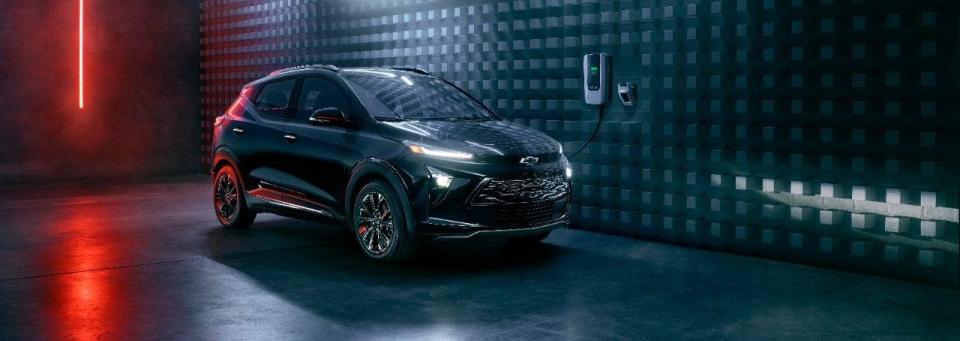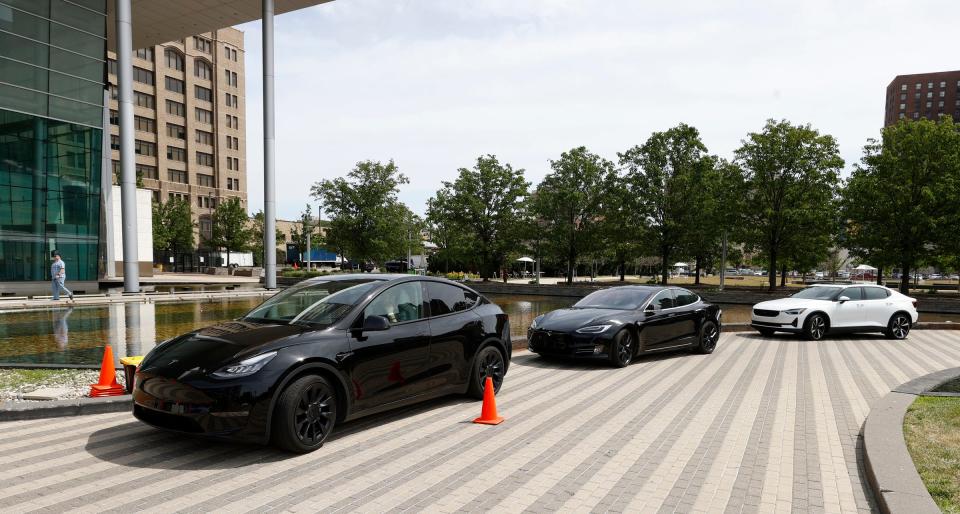What to know about the 2023 tax credit for clean vehicles if you're car shopping
Hearing buzz about a maximum tax credit of up to $7,500 can perk up interest from shoppers who could be eying a new Tesla or Ford Mustang Mach-E in 2023.
But the rules and qualifications are terribly detailed. Not everyone will be able to simply lock in an EV tax credit if they plan to buy a plug-in vehicle or fuel cell vehicle this year or next.
Worse yet, a vehicle that qualifies for an EV tax credit in early 2023 might not qualify later in the year. It's complicated and new Internal Revenue Service guidance to be issued as early as March will determine what vehicles get the credit later this year, based on the sourcing of the critical minerals and components in the battery.
Battery-electric vehicles continue to be expensive relative to other cars and trucks on the market. Even so, EV sales soared in 2022, as sales volumes reached past 800,000 for the first time — up 65% from 2021, according to Kelley Blue Book estimates. Cox Automotive is forecasting that EV sales will go past the 1 million mark in 2023 in the United States. Overall, Cox Automotive is forecasting that sales for new cars and light trucks will hit 14.1 million in 2023.

The Inflation Reduction Act of 2022, signed by President Joe Biden in August, changed the rules for the EV tax credit for vehicles purchased from 2023 to 2032.
Oddly enough, many consumers who want to buy an electric SUV or truck likely will need to get tax advice from their car dealers on what specific vehicle qualifies for the EV tax credit or how much of a credit they might be able to get.
More:How inflation and taxes hit giant profit-sharing checks for autoworkers
About 35 or so plug-in and fuel cell models currently qualify for the tax credit early in 2023 based on the list online at IRS.gov under the title "Manufacturers and Models for New Qualified Clean Vehicles Purchased in 2023 or After." The IRS list can change over time.
After guidance is issued, though, what exact vehicle qualifies will vary.
If you aim to get the credit based on the current list, it's expected that buyers must take possession of their new clean cars, SUVs or trucks before the IRS puts the new guidance into place relating to the sourcing of battery minerals and components.
"Talk to the dealer," recommends Chad Resner, a director with Baker Tilly's specialty tax team in the credits and incentives practice in Madison, Wisconsin.
"The dealer should be able to tell you, 'Yes, this car is eligible, and this is the amount of credit you can claim on it,' " Resner said.
Once the IRS issues more guidance on critical minerals and battery components in March or later, Resner noted, the dynamics will change for what vehicle qualifies for a credit. Much will depend on the battery in each car.
"After guidance is issued," he said, "a car could have a battery that doesn’t qualify for any credit and another car of the same model could have a battery that does qualify for the credit."
In 2023 and going forward, Resner said, the dealer has to give a report to a consumer who buys a clean vehicle that states the amount of the credit for that vehicle. You'd have to buy a car from a registered dealer to claim the clean vehicle credit.

Consumers need to keep the report to use when they file their tax returns in the future. For those buying in 2023 and after, the base amount of the credit is $2,500 for vehicles that qualify. The EV car buyer then can get up to an additional $5,000 but that credit depends on the size of the battery. The buyer in 2023 and after gets $417 for every kilowatt hour above 7 kilowatt hours of battery capacity.
For some vehicles, you could be looking at a $4,500 credit, not $7,500.
Once the Treasury Department issues the critical mineral and battery component guidance, you'd get a $3,750 credit for meeting the mineral requirements and a $3,750 credit for meeting battery component requirements. Vehicles that meet both the mineral and the battery component requirements, according to information from the U.S. Department of Energy, would then be eligible for a total of $7,500.
More:Which vehicles qualify for tax credits up to $7,500? Figuring out isn't easy.
Higher income buyers won't qualify
One point to understand upfront, some buyers won't qualify for any EV tax credits based on the individual's income.
To qualify for an EV tax credit for a new vehicle bought in 2023 or after, your modified adjusted gross income may not exceed $300,000 for married couples filing jointly; $225,000 for those filing as head of households and $150,000 for singles and other filers.
"There are a lot of specific cars and taxpayers that are excluded from this," Resner said.
The taxpayer can, according to the IRS, use their modified AGI for the year they take delivery of the clean car, truck or SUV or use their modified AGI for the previous year, whichever is less. If you take delivery in 2023 then, you can use 2023 modified AGI or 2022 modified AGI.
The IRS notes: "If your modified AGI is below the threshold in one of the two years, you can claim the credit."
The credit is nonrefundable, which means you cannot get back more on the tax credit than you owe in taxes. And you also cannot apply any excess credit to future tax years.
Pay very close attention to the MSRP
The IRS has two maximum limits listed for the manufacturer's suggested retail price for a certain vehicle to qualify for the tax credit. It's up to $80,000 for vans, sport utility vehicles and pickup trucks. And it's up to $55,000 for other vehicles. In addition to vehicles powered solely by electricity, plug-in hybrids may qualify.
The applicable limit for the Ford F-150 Lightning — a 2022 or 2023 model, again new — is $80,000.
A new 2022 or 2023 Ford Escape Plug-In Hybrid also has an $80,000 limit.
A Chevy Bolt or Chevy Bolt SUV has a $55,000 MSRP limit, based on IRS guidance for the EV credit.
"If a new vehicle has an MSRP above the stated number — it's either $80,000 or $55,000 depending on the type of car — it is not eligible for the credit," said Resner, at Baker Tilly.
Remember, the tax credit for new clean vehicles is based on the MSRP — not what you pay to get the car off the lot. Say, for example, you'd pay $75,000 after some great discounts but a vehicle has an MSRP of $85,000. You'd lose out on the tax credit because the MSRP is above the cap allowed for the clean vehicle credit.

"The final MSRP includes any trim, options, or accessories for the particular vehicle and excludes the destination fee," according to an Energy Department alert.
Too many options on that vehicle could put you over the MSRP limit to qualify for the clean vehicle tax credit offered on sales in 2023 through 2032.
What's on the IRS list?
Some manufacturers, including Toyota Motor Sales, Porsche, Mercedes-Benz and others, entered into an agreement to become a "qualified manufacturer." But they have not yet submitted a list of specific makes and models that are eligible for the credit. The IRS suggests coming back for updated information at IRS.gov.
As of late February, the vehicles that could qualify on the IRS new qualified clean vehicle list included, among others:
A 2023 Audi Q5 TFSI e Quattro plug in hybrid vehicle with an $80,000 MSRP or lower.
A 2021 and 2022 Nissan Leaf S Plus and SL Plus — as well as other select Nissan Leaf vehicles — with a $55,000 MSRP limit.
The 2022 and 2023 model year Rivian R1S and R1T with an $80,000 MSRP or lower.
The 2022 and 2023 Chrysler Pacifica plug in hybrid with an $80,000 MRSP limit.
The 2022 and 2023 Jeep Wrangler 4xe and Grand Cherokee 4xe with an $80,000 MSRP limit.
The 2022 and 2023 Cadillac Lyriq with an $80,000 MSRP limit.
The 2022 and 2023 Tesla Model 3 Rear-Wheel Drive, Long Range and Performance sedans with an MSRP of $55,000 or below.
The 2022 and 2023 Ford E-Transit with an $80,000 MSRP or lower.
The 2022 and 2023 Ford Mustang Mach-E with an MSRP of $80,000 or lower.
The 2022 and 2023 Lincoln Aviator and Lincoln Cosair Grand Touring with an $80,000 MSRP or lower.
The 2022 and 2023 Ford F-150 Lightning with an $80,000 MSRP or lower.
A new break for used cars
Beginning Jan. 1, a taxpayer might qualify for a maximum $4,000 tax credit for buying a qualified used electric vehicle or fuel cell vehicle from a licensed dealer in 2023 or after with a purchase price of $25,000 or less. The "previously owned clean vehicle credit" equals 30% of the sale price up to a maximum credit of $4,000.
Other rules apply. For example, a used clean vehicle bought in 2023 must be a model year of 2021 or older.
The IRS has a list online of qualifying used clean vehicles — including a 2014, 2015 or 2016 Chevy Spark EV and a 2019, 2020 and 2021 Subaru Crosstrek Plug-In Hybrid. The list also includes the 2017, 2018, 2019, 2020 and 2021 Toyota Prius Prime Plug-In Hybrid.
To get the credit, you must buy from a dealer — not another individual. The used car sale would have to be the first sale after the original purchase; you can't expect a credit if that EV had two or three other previous owners.
If you made such a purchase in 2022 or earlier, you don't qualify for a used vehicle credit.
For that EV credit on used cars, your modified adjusted gross income may not exceed $150,000 for married filing jointly or a surviving spouse; $112,500 for heads of households or $75,000 for all other filers.
The credit is nonrefundable, so you can't get back more on the credit than you owe in taxes. You can't apply any excess credit to future tax years.
More changes ahead
Some rules will change in 2024. Beginning next year, for example, a clean vehicle will not qualify for any tax credit if any minerals or components are sourced from “foreign entities of concern,” including China or Russia.
According to Consumer Reports, a 2022 analysis of the EV supply chain from the International Energy Agency shows that the vast majority of minerals, components, and battery cells are currently sourced from China. But this restriction won't apply to used cars, SUVs or trucks.
Next year, car buyers would face another option for getting that credit money earlier in the game.
Starting in 2024, Resner said, the dealer will be able to "buy" the tax credit from the buyer. As a result, the dealer can use that money toward the down payment on your car. "You get immediate access to the money," Resner said.
"When you get a credit on your tax return, you're going to have to file your tax return and then get that refund," he said. "If you bought a car now, you're not filing until this time next year and then you're going to have to wait for the IRS to process that return."
Ahead, though, the dealer would need to ask your income range to verify and certify that you'd qualify for the upfront credit. "If you lie to the dealer," Resner said, "you're going to get a tax bill."
Contact Susan Tompor: stompor@freepress.com. Follow her on Twitter @tompor. To subscribe, please go to freep.com/specialoffer.
This article originally appeared on Detroit Free Press: What to know about EV tax credits if you're car shopping in 2023

